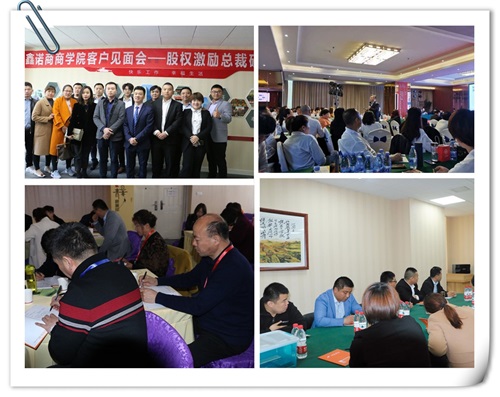(1)通過股權轉讓授子激勵股權的問題。如果股權轉讓方是公司,,則向激勵對象轉讓的股權價格不能過低(比如低于凈資產價格,,甚至直接以注冊資本作價),否則會存在較大的稅務風險:如果股權轉讓方是自然人,,則不涉及稅務問題,。
(1) The tax issue of granting incentive shares through equity transfer. If the equity transferor is a company, the price of the equity transferred to the incentive object cannot be too low (such as lower than the net asset price, or even directly priced at the registered capital), otherwise there will be significant tax risks: if the equity transferor is a natural person, there will be no tax issues involved.
不過,
山東股權激勵落地公司提醒,,根據財政部,、國家稅務總局《關于完善股權激勵和技術人股有關所得稅政策的通知》(財稅[2016]101號)文件規(guī)定,非上市公司授予本公司員工的股票期權,、股權期權,、限制性股票和股權獎勵,符合規(guī)定條件的,,經向主管稅務機關備案,,可實行遞延納稅政策。即員工在取得股權激勵時可暫不納稅,,遞延至轉讓該股權時納稅,。
However, Shandong Equity Incentive Landing Company reminded that according to the Notice on Improving the Income Tax Policies Related to Equity Incentive and Technical Human Shares (CS [2016] No. 101) issued by the Ministry of Finance and the State Administration of Taxation, the stock options, stock option, Restricted stock and equity awards granted to the employees of the Company by unlisted companies can be deferred tax policy after filing with the competent tax authority if they meet the specified conditions. When employees obtain equity incentives, they may temporarily not pay taxes and defer tax payment until the transfer of the equity.
(2)通過轉增股本實施股權激勵的稅務問題。根據國家稅務總局《關于股權獎勵和轉增股本個人所得稅征管問題的公告》(國家稅務總局公告2015年第80號)規(guī)定:
(2) The tax issue of implementing equity incentives through the conversion of capital stock. According to the Announcement of the State Administration of Taxation on the Administration of Individual Income Tax on Equity Rewards and Conversion of Capital Stock (Announcement No. 80 of 2015):
①非上市及未在中小企業(yè)股份轉讓系統掛牌的中小高新技術企業(yè)以未分配利潤,、盈余公積,、資本公積向個人股東轉增股本,并符合財稅[2015]116號文件有關規(guī)定的,,納稅人可分期繳納個人所得稅;非上市及未在中小企業(yè)股份轉讓系統掛牌的其他企業(yè)轉增股本,,應及時代扣代繳個人所得稅。
① Small and medium-sized high-tech enterprises that are not listed or not listed in the national small and medium-sized enterprise share transfer system can transfer undistributed profits, surplus reserves, and capital reserves to individual shareholders to increase their share capital, and comply with the relevant provisions of the Finance and Taxation [2015] No. 116 document. Taxpayers can pay individual income tax in installments; Non listed and non listed enterprises that have not been listed on the national small and medium-sized enterprise share transfer system shall deduct and pay personal income tax in a timely manner when converting their share capital.

②上市公司或在中小企業(yè)股份轉讓系統掛牌的企業(yè)轉增股本(不含以股票發(fā)行溢價形成的資本公積轉增股本),,按現行有關股息紅利差別化政策執(zhí)行,。
② Listed companies or enterprises listed on the national small and medium-sized enterprise share transfer system shall increase their share capital (excluding capital reserves converted from stock issuance premiums) in accordance with the current dividend differentiation policies.
③股權回購產生的稅務問題。這種情況下,,--般先判斷由哪-方導致的回購,,并由責任方承擔由此產生的稅務成本。實踐中,,一般是激勵對象觸發(fā)股權回購的約定條款,,因而由激勵對象承擔稅務成本比較合理。
③ Tax issues arising from equity buybacks. In this case, it is common to first determine which party caused the repurchase, and the responsible party should bear the tax costs incurred as a result. In practice, it is generally the agreed terms of the incentive object triggering the equity repurchase, so it is reasonable for the incentive object to bear the tax costs.
④分紅產生的稅務問題,。一般由激勵對象自行負擔成本,。根據國家稅務總局《關于股權激勵有關個人所得稅問題的通知》(國稅函[2009]461號)規(guī)定,, “個人因任職、受雇從上市公司取得的股票增值權所得和限制性股票所得,,由上市公司或其境內機構按照‘工資,、薪金所得’項目和股票期權所得個人所得稅計稅方法,依法扣繳其個人所得稅’
④ Tax issues arising from dividends. Generally, the tax costs are borne by the incentive recipients themselves. According to the Notice on Individual Income Tax Issues Related to Equity Incentive (Guo Shui Han [2009] No. 461) issued by the State Administration of Taxation, "income from stock appreciation rights and Restricted stock obtained by individuals from listed companies due to their employment and employment shall be withheld by listed companies or their domestic institutions according to the individual income tax calculation method of" income from wages and salaries "and stock options"
⑤轉讓產生的稅務問題,。根據財政部,、國家稅務總局《關于完善股權激勵和技術人股有關所得稅政策的通知》(財稅[2016]101號)文件規(guī)定,股權轉讓時,,按照股權轉讓收入減除股權取得成本以及合理稅費后的差額,,適用“財產轉讓所得”項目,按照20%的稅率計算繳納個人所得稅,。股權轉讓時,,股票(權)期權取得成本按行權價確定,限制性股票取得成本按實際出資額確定,,股權獎勵取得成本為零。
⑤ Tax issues arising from the transfer. According to the Notice of the Ministry of Finance and the State Administration of Taxation on Improving the Income Tax Policies related to Equity Incentives and Technical Personnel Stocks (Cai Shui [2016] No. 101), when transferring equity, the "property transfer income" item shall be applied based on the difference between the equity transfer income minus the equity acquisition cost and reasonable taxes, and personal income tax shall be calculated and paid at a 20% tax rate. At the time of equity transfer, the acquisition cost of stock (option) option is determined by the exercise price, the acquisition cost of Restricted stock is determined by the actual amount of capital contribution, and the acquisition cost of equity incentive is zero.
The main five types of tax issues related to equity incentives have been explained. We hope they can provide you with good help. For more information, please come to our website http://nequ.com.cn Consult!



 13698613138
13698613138


